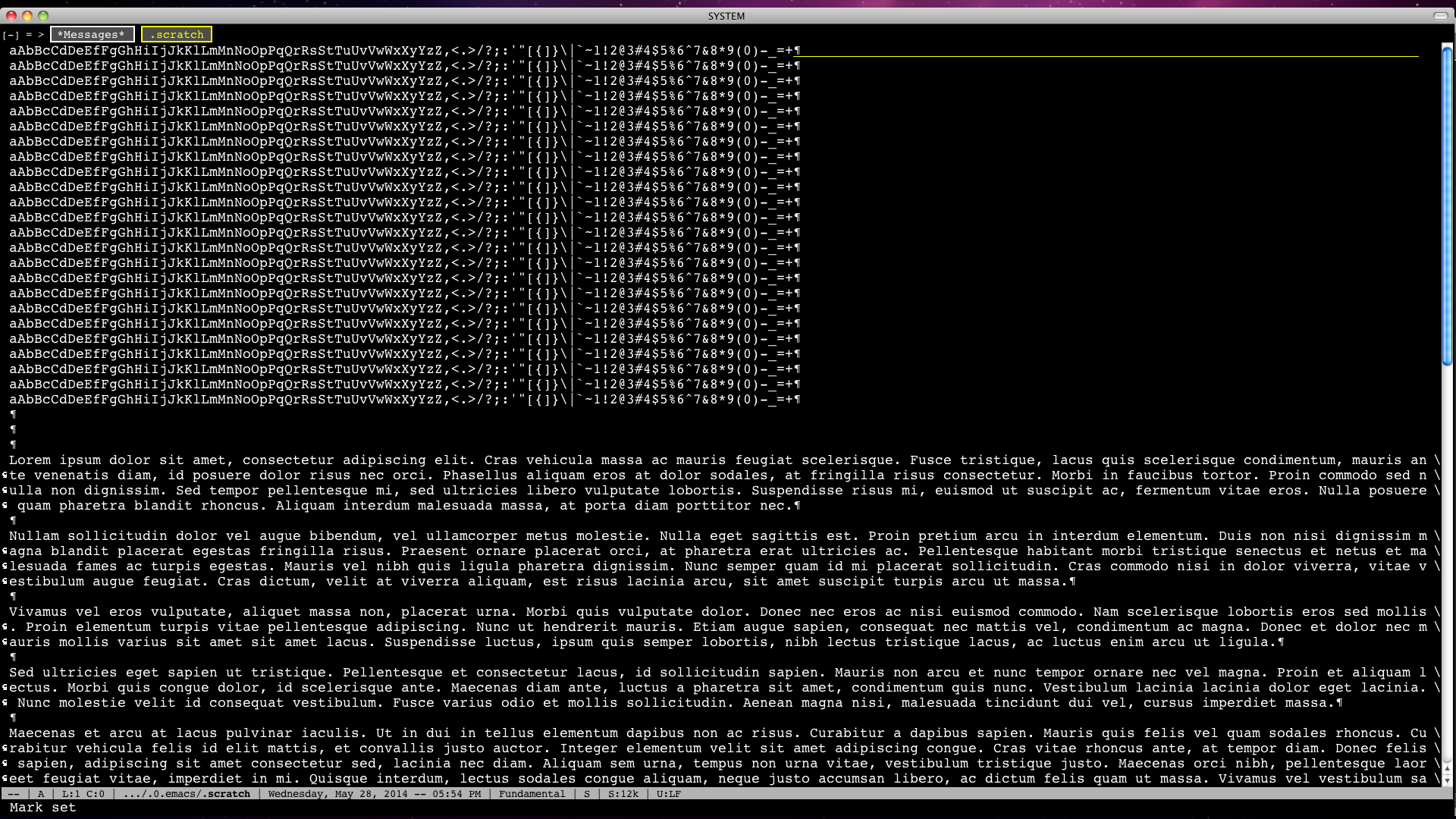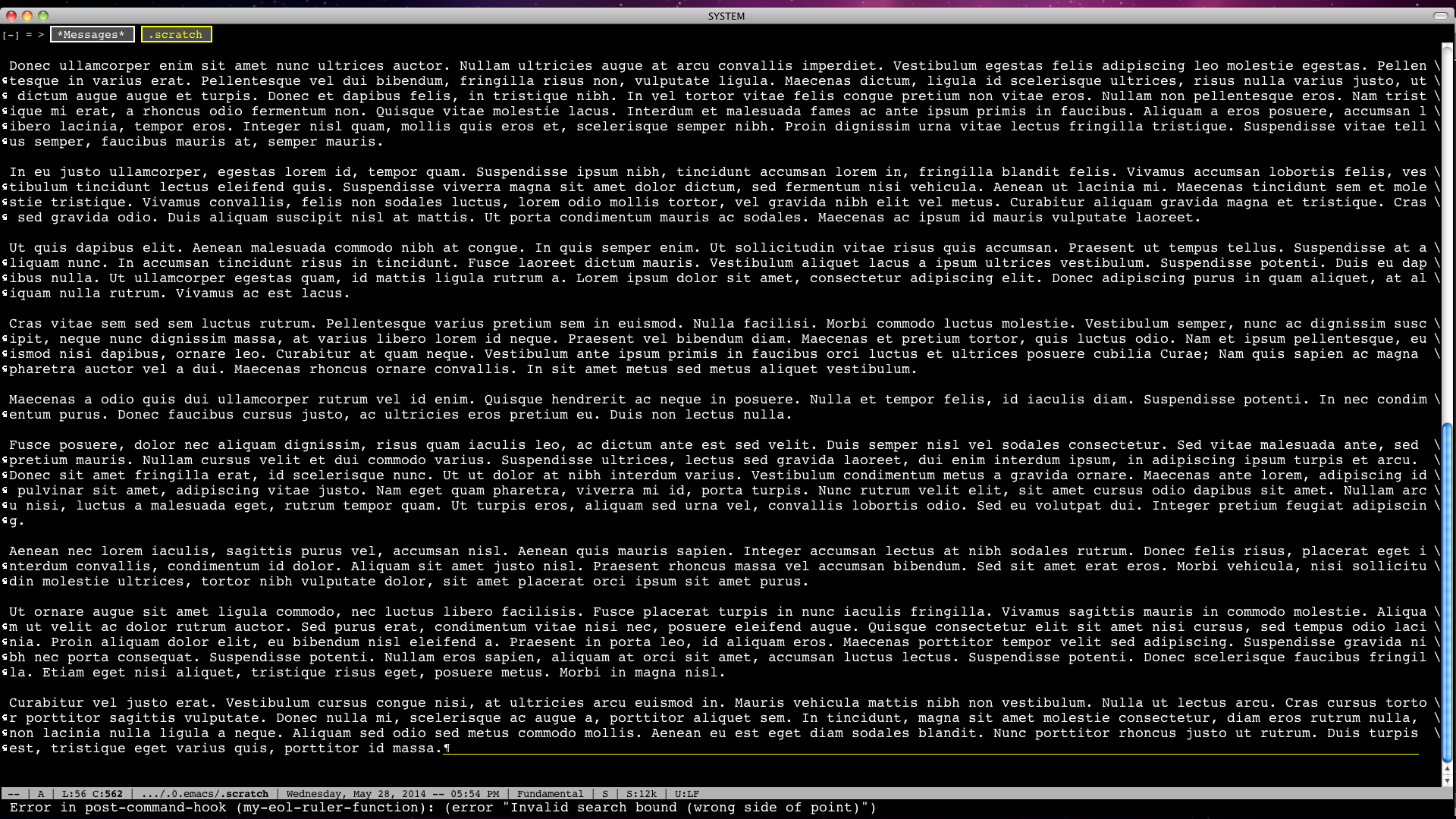Is it possible to calculate a new window-start/end without a redisplay occurring? If so, then an example would be greatly appreciated. If not, then what is the best way to approximate it?
Example: We want to move to a new area of the buffer somewhere off screen, and place overlays when we get there. We might be using page-down or scroll-down or paragraph-down or end-of-buffer. When we get to that new point, we want to calculate the new window-start and the new window-end. However, we want to avoid a momentary naked looking buffer without any overlays. Ideally, the redisplay would occur once those overlays are added. I want to restrict new overlays to the new region based upon the new window-start/end.
Point-Min: point = 1
Old Window Start: point = 1000
Old Window End: point = 1500
New Window Start: point = 3500
New Window End: point = 4000
Point-Max: point = 6000
Problem: When using the post-command-hook to try and calculate the new window-start and new window-end, the previous display positions are being used instead -- i.e., the old window-start and the old window-end.
Here is a sample of the project I am working on. Absent fixing the window-start \ window-end problem, I get the following error:
Error in post-command-hook (my-eol-ruler-function):
(error "Invalid search bound (wrong side of point)")`.
The error happens when going from (point-min) to the end of the buffer with the interactive function end-of-buffer. In the context of this error, (point-max) is beyond the old window-end.
EDIT: Updated code to include a message: (message "point: %s | window-start: %s | window-end: %s | point-max: %s" (point) (window-start) (window-end) (point-max) ). The message is used to demonstrate that the new window-start and new window-end are not calculated within the post-command-hook because a redisplay has not yet occurred. However, I am trying to avoid a redisplay until after the new overlays have been placed -- otherwise, a naked buffer without overlays is visible for a split second.
(defvar my-eol-ruler nil
"A horizontal ruler stretching from eol (end of line) to the window edge.")
(make-variable-buffer-local 'my-eol-ruler)
(defvar my-eol-pilcrow nil
"A pilcrow symbol placed at the end of every line except the current line.")
(make-variable-buffer-local 'my-eol-pilcrow)
(defun my-eol-ruler-function ()
(let* (
(opoint (point))
(window-width (window-width))
(window-start (window-start))
(window-end (window-end))
(col-eovl
(save-excursion
(vertical-motion 1)
(skip-chars-backward " \r\n" (- (point) 1))
(- (current-column) (progn (vertical-motion 0) (current-column)))))
(my-current-line-length (- (- window-width col-eovl) 3))
(pilcrow
(propertize (char-to-string ?\u00B6)
'face '(:foreground "white")
'cursor t))
(pilcrow-underlined
(propertize (char-to-string ?\u00B6)
'face '(:foreground "white" :underline "yellow")
'cursor t))
(underline (propertize (char-to-string ?\u2009)
'display `(space :width ,my-current-line-length)
'face '(:underline "yellow")
'cursor t)))
(when (or my-eol-ruler my-eol-pilcrow)
(dolist (description `(
,my-eol-ruler
,my-eol-pilcrow ))
(remove-overlays (point-min) (point-max)
'after-string description)) )
(setq my-eol-ruler (concat pilcrow-underlined underline))
(setq my-eol-pilcrow pilcrow)
(save-excursion
(end-of-line)
(overlay-put (make-overlay (point) (point))
'after-string my-eol-ruler ) )
(message "point: %s | window-start: %s | window-end: %s | point-max: %s"
(point)
(window-start)
(window-end)
(point-max) )
(save-excursion
(goto-char window-end)
(while (re-search-backward "\n" window-start t)
(let* (
(pbol (point-at-bol))
(pbovl (save-excursion (vertical-motion 0) (point)))
(peol (point))
(peol-pbol-region-p
(if (region-active-p)
(= peol pbol)))
(eol-inside-region-p
(if (region-active-p)
(and
(<= reg-beg peol)
(> reg-end peol))))
(col-eovl
(save-excursion
(vertical-motion 1)
(skip-chars-backward " \r\n" (- (point) 1))
(- (current-column) (progn (vertical-motion 0) (current-column)))))
(my-last-column (current-column))
(window-width-bug-p (= my-last-column (- window-width 1)))
(shazbot-pbol
(save-excursion
(end-of-line)
(re-search-backward "\s\\|\t" pbol t) (+ (point) 1)))
(wrapped-window-width-bug-p (= col-eovl (- window-width 1))) )
(when
(or
(< opoint pbol)
(> opoint peol))
(overlay-put (make-overlay peol peol) 'after-string my-eol-pilcrow))))) ))
(add-hook 'post-command-hook 'my-eol-ruler-function)
Beginning of the buffer, before the error occurs.

End of the buffer -- the error occurs when executing the interactive function end-of-buffer from a point at the beginning of the buffer.
Error in post-command-hook (my-eol-ruler-function):
(error "Invalid search bound (wrong side of point)")

See also Emacs bug tracker feature request #22404 (which has not yet been implemented, but the mailing archive contains a rough draft rudimentary patch that creates a new hook for this specific issue): https://debbugs.gnu.org/cgi/bugreport.cgi?bug=22404
window-start and window-end BEFORE visual redisplay.;;;;;;;;;;;;;;;;;;;;;;;;;;;;;;;;;;;;;;;;;;;;;;;;;;;;;;;;;;;;;;;;;;;;;;;;;;;;;;;;;;
;; test-mode
;; A minor-mode for testing `window-start` / `window-end` BEFORE visual redisplay.
(defvar test-this-command nil
"This local variable is set within the `post-command-hook`; and,
is also used by the `window-scroll-functions` hook.")
(make-variable-buffer-local 'test-this-command)
(defun test-post-command-hook-fn ()
"A function attached to the `post-command-hook`."
(setq test-this-command this-command)
(test-demo-fn))
(defun test-window-scroll-functions-fn (win _start)
"A function attached to the `window-scroll-functions` hook."
(test-demo-fn))
(defun test-demo-fn ()
"This is a test-mode demonstration function."
(when
(and
test-mode
test-this-command
(window-live-p (get-buffer-window (current-buffer)))
(not (minibufferp))
(pos-visible-in-window-p (point)
(get-buffer-window (current-buffer) (selected-frame)) t))
(let* (
(selected-window (selected-window))
(window-start (window-start selected-window))
(window-end (window-end selected-window t)) )
(message "window-start: %s | window-end: %s" window-start window-end)
(setq test-this-command nil) )))
(define-minor-mode test-mode
"A minor-mode for testing `window-start` / `window-end` BEFORE visual redisplay."
:init-value nil
:lighter " TEST"
:keymap nil
:global nil
:group nil
(cond
(test-mode
(set (make-local-variable 'scroll-conservatively) 101)
(add-hook 'post-command-hook 'test-post-command-hook-fn nil t)
(add-hook 'window-scroll-functions 'test-window-scroll-functions-fn nil t)
(when (called-interactively-p 'any)
(message "Turned ON `test-mode`.")))
(t
(kill-local-variable 'scroll-conservatively)
(kill-local-variable 'test-this-command)
(remove-hook 'post-command-hook 'test-post-command-hook-fn t)
(remove-hook 'window-scroll-functions 'test-window-scroll-functions-fn t)
(when (called-interactively-p 'any)
(message "Turned OFF `test-mode`.") ))))
;;;;;;;;;;;;;;;;;;;;;;;;;;;;;;;;;;;;;;;;;;;;;;;;;;;;;;;;;;;;;;;;;;;;;;;;;;;;;;;;;;
Offhand, I'd say that the error is raised because you pass a BOUND arg to a search function. For example:
(re-search-backward "\n" window-start t)
(re-search-backward "\s\\|\t" pbol t)
Check your values of window-start and pbol. Remember that when you search backward the bound must not be greater than the current position (point).
I think you want to use jit-lock-register instead of post-command-hook. This way, the redisplay code will call you back once it has decided of a window-start and you'll be able to add the overlays you want before the buffer's content is displayed.
If you love us? You can donate to us via Paypal or buy me a coffee so we can maintain and grow! Thank you!
Donate Us With